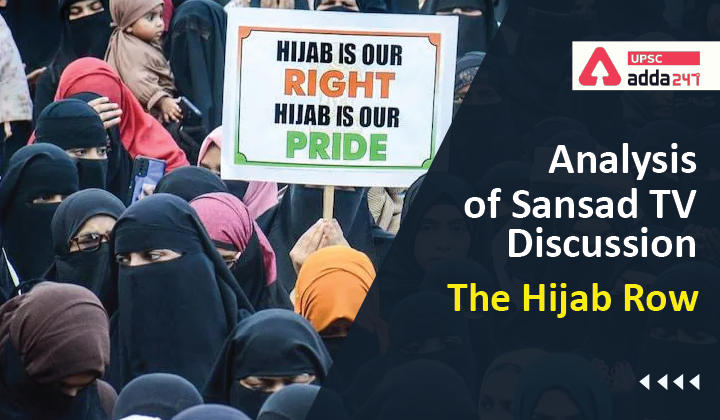Table of Contents
Analysis of Sansad TV Discussion: The Hijab Row
Relevance
”GS 1, GS 2: Fundamental Rights, Judiciary, Government Policies & Interventions, Women’s Issues”
Introduction
- Karnataka is witnessing a huge uproar over the insistence of some Muslim girls to wear hijab in schools and colleges.
- The controversy erupted after a college in Udupi refused permission to Muslim girls for wearing hijab in classrooms citing the dress code that was in effect for students.
- After a five-day break to cool tensions over the hijab ban controversy, high schools reopened in Karnataka on Monday.
- As a precautionary measure, the police in Udupi and Mangaluru has imposed prohibitory orders near campuses for six days till Saturday.
- Section 144 of CrPC has been clamped around 200-metre radius of all the high schools from Monday till February 19.
What did Karnataka High Court Say?
- The Karnataka high court earlier hearing on petitions questioning the ban on wearing of hijabs (headscarves) by Muslim girl students on college premises Indicated that it will pass an interim order.
- Yesterday, the Karnataka High Court in its interim order relating to the Hijab issue has restrained students from attending classes wearing headscarves or saffron scarves.
What did the Organization of Islamic Countries(OIC) say?
- OIC’s general secretariat had said in its statement that the “continued attacks targeting Muslims and their places of worship, the recent trend of anti-Muslim legislations in different states and rising incidents of violence against Muslims on flimsy pretexts are indicative of the growing trend of Islamophobia in India.”
- The OIC had expressed deep concern over what it said were “public calls for genocide of Muslims” at the Dharam Sansad in Haridwar last December, harassment of Muslim women on social media and a ban on headscarves for Muslim students in Karnataka.
- It called on the world community, especially UN mechanisms and Special Procedures of the Human Rights Council, to take necessary measures, and called on India to ensure the safety and security of Muslims and to bring the “instigators and perpetrators of acts of violence and hate crimes against them to justice”.
How India Reacted to OIC?
- External affairs ministry spokesman Arindam Bagchi said that the OIC continues to be “hijacked” by vested interests to further their nefarious propaganda against India.
- India clearly said that ”Issues in India are considered and resolved in accordance with our constitutional framework and mechanisms, as well as democratic ethos and polity.”
- With a quick and firm reply, India said that the communal mindset of the OIC Secretariat does not allow for a proper appreciation of these realities.
- India also said that OIC continues to be hijacked by vested interests to further their nefarious propaganda against India.
What is the OIC?
- The OIC, formerly the Organisation of the Islamic Conference, is an international organisation founded in 1969, consisting of 57 member states.
- It is reported to be the world’s second-largest inter-governmental organisation after the United Nations.
- The majority of its member states are Muslim-majority countries, while others have significant Muslim populations, including several African and South American countries.
- While the 22 members of the Arab League are also part of the OIC, the organisation has several significant non-Arab member states, including Turkey, Iran and Pakistan.
- It also has five observer members, including Russia and Thailand.
- The organisation has permanent delegations to the UN and the European Union and its official languages are Arabic, English and French
An Issue of Rights vs Rights
- While muslim students are arguing in favour of their freedom, the Government is of the view that compelling a student to remove the headscarf is not a violation of Article 25.
- Aa the wearing of head-scarves will have an adverse impact on law and order by pitting two communities against one another, and thereby, enable the Government to prohibit religious attire in the interest of public order – one of the grounds on which a right under Article 25 can be curbed.
- On the other hand denial of entry into schools amounts to violation of the students’ right to education under Article 21A.
What is Article 25?
- The freedom of conscience and to profess, practise and propagate religion is guaranteed by Article 25. This freedom is subject to ‘public order, morality and health’.
- It also makes it clear that there can be a law regulating any economic, financial, political or other secular activity which may be associated with religious practice or to provide for social welfare and reform.
What needs to be done?
- Some religious organisations are using students to try to divide society. The government need to quickly identify them and initiate appropriate legal action against them.
- All kinds of safety measures have to be taken to ensure peace and order in the state so that students attend classes without any hindrance.
- The government need to do all efforts to depoliticize the issue and engage students in their academic activities without any fear or feeling of insecurity.



 TSPSC Group 1 Question Paper 2024, Downl...
TSPSC Group 1 Question Paper 2024, Downl...
 TSPSC Group 1 Answer key 2024 Out, Downl...
TSPSC Group 1 Answer key 2024 Out, Downl...
 UPSC Prelims 2024 Question Paper, Downlo...
UPSC Prelims 2024 Question Paper, Downlo...




